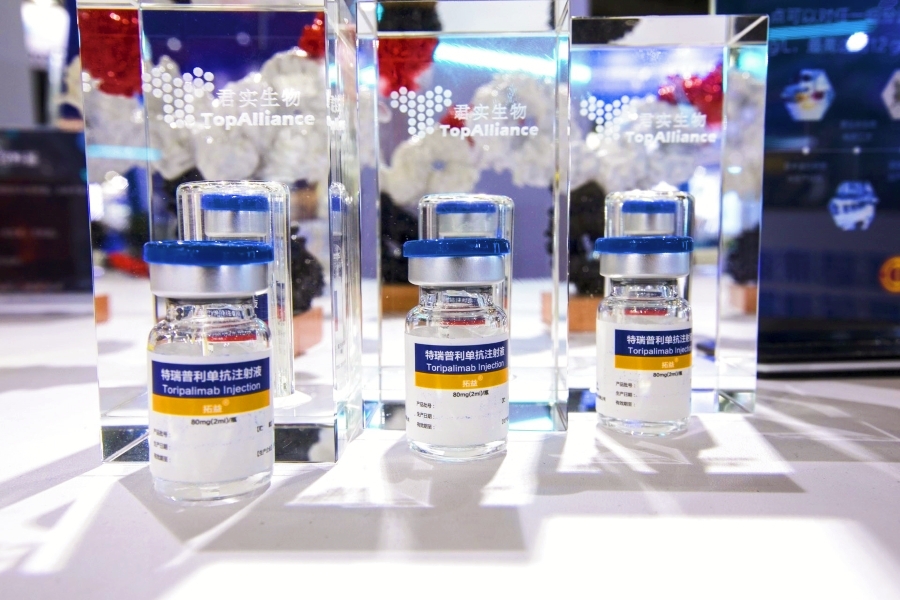Will Junshi Bio’s loss-making headaches ease with landmark U.S. drug approval?

The FDA has given the nod to the Chinese company’s PD-1 drug, but most of the benefits will go to a third-party licensee
Key Takeaways:
- Junshi Bio will receive milestone payments and 20% of sales of its PD-1 drug Toripalimab in the U.S., following the drug’s recent approval by the FDA
- The drug maker’s revenue fell 19% year-on-year in the first nine months of 2023, as its net loss narrowed to 1.41 billion yuan
By Molly Wen
In its ongoing quest to take its drugs overseas, China passed a major milestone late last month when Shanghai Junshi Biosciences Co. Ltd. (1877.HK; 688180.SH) announced the U.S. approval of its self-developed cancer drug Toripalimab, also known as Loqtorzi. With that nod, Toripalimab became not only the first drug approved by the U.S. FDA to treat nasopharyngeal carcinoma, but also the first China-developed treatment approved by the U.S. from an emerging class of targeted drugs called anti-PD-1 monoclonal antibodies.
The approval capped a long and arduous “overseas journey” for Junshi, whose U.S. clinical trials began in 2017. It submitted its biologics license application to the Food and Drug Administration (FDA) in early 2021, only to meet a setback when FDA officials couldn’t complete their review due to inability to visit Junshi’s production facilities in China during the pandemic. But it endured with its application, finally yielding the coveted FDA approval.
But for Junshi, the milestone was tempered with a slightly bitter taste, because it previously licensed U.S. pharmaceutical company Coherus (CHRS.US) to sell Toripalimab in the U.S and Canada as early as 2021. Under their agreement, Coherus made a one-time down payment of $150 million to Junshi and, upon reaching agreed milestones, will make up to $380 million in additional payments. Junshi will also receive 20% of Coherus’ Toripalimab sales.
Junshi’s shares got a boost after the announcement, closing up 5.5% in the domestic Chinese A-share market, and rising by an even bigger 8.2% in Hong Kong.
Toripalimab is also expected to find a place in Europe. Over the last 12 months, regulators in both the EU and UK have accepted applications for the drug in combination with other drugs to treat nasopharyngeal carcinoma and squamous carcinoma of the esophagus.
Junshi said it would continue to expand its global commercialization network to more than 50 countries, working with partners in Southeast Asia, the Middle East and North Africa, Latin America, India and South Africa, in addition to its collaboration with Coherus in the U.S. and Canada.
“In the U.S., there are already six competitors in the PD-1 market, and we are the seventh. However, our indication is nasopharyngeal cancer and we are the first and only drug approved (for) nasopharyngeal cancer treatment, which enables us to differentiate ourselves from other companies,” said Junshi CEO Li Ning at an Oct. 30 press conference to discuss the drug’s landmark U.S. approval. “In addition, our clinical data is bright and internationally recognized.”
Limited revenue booster
Nasopharyngeal cancer is a malignant tumor that occurs in the mucosal epithelium of the nasopharynx, and is a common form of malignant tumor of the head and neck. According to the World Health Organization, more than 130,000 cases of nasopharyngeal cancer occurred globally in 2020, including about 60,000 in China. The number of annual new cases will increase to 260,000 per year by 2040, and the number of deaths is forecast to increase to 100,000 per year. But the incidence of nasopharyngeal cancer differs significantly based on geography.
Junshi said that Coherus estimates there are 2,000 new nasopharyngeal cancer patients in the U.S. each year, meaning U.S. sales for Toripalimab could be worth as much as $200 million – not an extremely high number for an oncology drug. Combined with the fact that Junshi is entitled to just 20% of the sales, the contribution from U.S. sales of the drug to the company’s revenue may be limited.
Instead, Toripalimab looks more attractive to Junshi for its potential in the China market. The drug is the first domestically developed PD-1 (L1) antibody approved by China, and can currently be used for six indications. Toripalimab generated 668 million yuan ($92 million) for Junshi in the first nine months of this year, accounting for about three-quarters of its 892 million yuan in product sales for that period. The company’s total product sales rose 67.8% year-on-year in the latest nine-month period.
Despite quickly becoming Junshi’s cash cow, Toripalimab is quite volatile as a revenue source. Its sales started to climb at the end of 2018 when it was first approved, and reached a peak of more than 1 billion yuan in 2020. But the figure went down as more PD-1 drugs entered the market, and totaled just 412 million yuan in 2021. The figure once again improved after China approved two large new indications in 2022, with domestic sales of Toripalimab climbing 78% that year to 736 million yuan.
Despite its status as one of China’s oldest players in the PD-1 category, Junshi’s lack of sales experience and capacity have held the company back and kept it in the loss column. The company’s revenue fell 19% to 986 million yuan in the first three quarter of the year, while its net loss narrowed by 188 million yuan to a 1.41 billion yuan loss.
When one considers the huge amounts of cash that Junshi has already consumed for its long clinical trials, the latest U.S. approval seems more significant as a signal rather than for bringing any major new revenue. After all, FDA approval is considered a gold standard in the global pharma industry, and could open many doors for the company as it expands to other overseas markets.
The company’s Hong Kong shares currently trade at a relatively high price-to-sales (P/S) ratio of about 15 times, well ahead of the 10 times for BeiGene (BGNE.US; 6160.HK; 688235.SH), owner of another PD-1 product approved in the EU. That suggests investors like what they see in Junshi, believing Toripalimab’s approval in the U.S. could mark the start of a new chapter in the company’s march towards eventual profitability.
Have a great investment idea but don’t know how to spread the word? We can help! Contact us for more details.
The Bamboo Works offers a wide-ranging mix of coverage on U.S.- and Hong Kong-listed Chinese companies, including some sponsored content. For additional queries, including questions on individual articles, please contact us by clicking here.
To subscribe to Bamboo Works free weekly newsletter, click here





